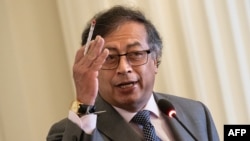Colombian President Gustavo Petro has called for the resignation of his entire cabinet as the government struggles to get legislation approved by Congress, two ministers told AFP on Wednesday.
Petro, the country's first leftist president, has so far not made his request public, but in a Twitter post on Tuesday he spoke of a "rethinking of the government."
The cabinet shakeup marks the most serious crisis within Petro's government in his tenure as president.
After nearly nine months in power, Petro has been unable to usher in the profound reforms in labor laws, health care, pensions and the judiciary that he promised during his campaign.
On Tuesday, the Liberal and Conservative parties, and the Social Party of National Unity (de la U) distanced themselves from the government, objecting to elements of his far-reaching reform plans.
Petro, for his part, called for an "emergency government ... given that Congress was incapable of approving simple very peaceful articles" on equitable redistribution of land.
No ministers have offered to resign publicly.
"The cabinet change does not look good for those who represent the traditional parties or those who have said 'No' to the reforms," tweeted Sergio Guzman, director of the consulting firm Colombia Risk Analysis.
After taking office August 7, Petro took a political risk with his leftist base by installing some ministers from centrist and rightist parties, such as Jose Antonio Ocampo, a Liberal Party veteran whom he named to the finance portfolio.
He put a conservative as defense minister and named to the interior and transportation posts politicians with ties to the parties now opposed to his reforms.
Petro, while serving as Bogota mayor from 2012 to 2015, oversaw constant shakeups of his team, and both political foes and former functionaries described him as difficult to work for in a team.
Two months ago, Petro urged his followers to take to the streets to pressure for congressional approval of the reforms. Speaking from the balcony of the presidential palace, Petro said he would not back down.
Weeks later, on February 28, Petro replaced three members of his cabinet, including centrist education minister Alejandro Gaviria, whose criticism of proposed health reforms had leaked to the media.
Also sacked were sports minister Maria Isabel Urrutia and culture minister Patricia Ariza.
In addition to the impasse in Congress, Petro has faced setbacks in his attempts to make peace with all of the country's illegal armed groups.
The National Liberation Army (ELN) guerrilla group, which is engaged in peace negotiations, refused to take part in a bilateral cease-fire proposed by the government on December 31.
The Gulf Clan, the largest drug trafficking cartel, was also part of the truce but the president reactivated military operations against the cartel after armed attacks against civilians and the security forces.




